Notes: Piaget, Kohlberg and Vygotsky Theory | Child Development and Pedagogy for CTET Preparation - CTET & State TET PDF Download
Throughout their lives, individuals undergo different stages of growth and learning. These stages encompass cognitive development, which involves acquiring knowledge through thoughts, experiences, and the senses; moral development, which concerns principles of right and wrong behavior; and socio-cultural development, which pertains to the arts, customs, and institutions of society. Psychologists and educators have formulated various theories to explain these developmental stages and understand their progression.
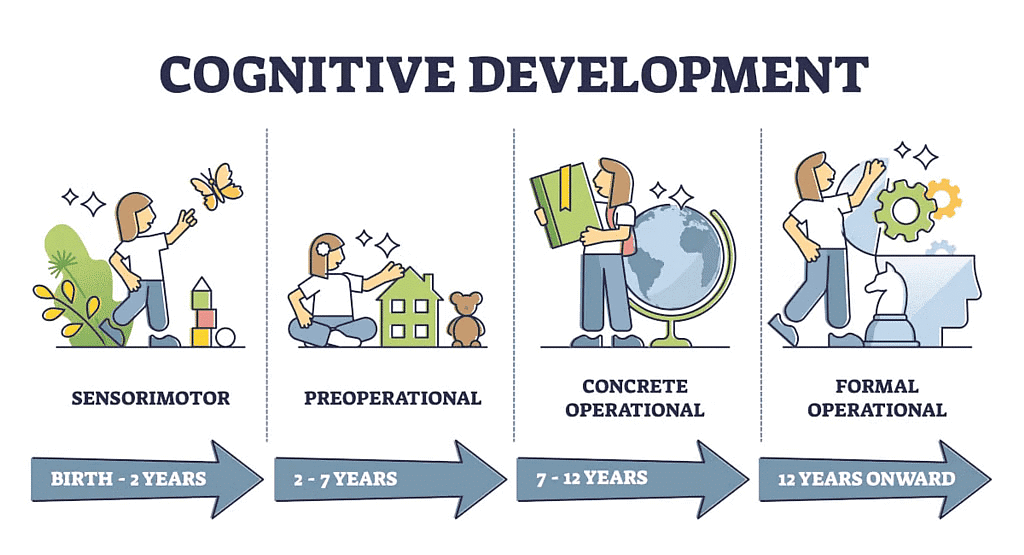
Theories of Development
Three psychologists have formulated some of the most well-known theories of development, which are explained below:
- Jean Piaget - This Swiss psychologist proposed his cognitive theory of child development in 1936.
- Lawrence Kohlberg - This American developmental psychologist introduced his theory of moral development of children in 1958.
- Lev Vygotsky - This Russian psychologist presented his theory of human cultural and bio-social development.
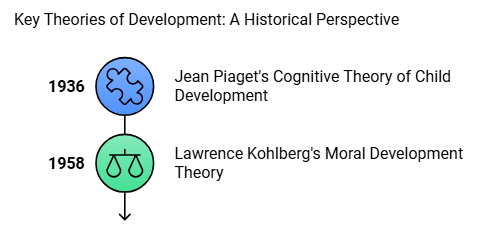
Piaget’s Theory of Cognitive Development
The term ‘cognitive’ relates to a person’s consciousness of their mind, which makes them active. Cognition involves activities such as reasoning and thinking. Piaget observed the intellectual abilities of children and adolescents, finding that children think differently from adults. The three components of Piaget’s theory are as follows:
Schemas
A schema is a systematic pattern of thought or behavior. For example, when solving a puzzle or problem involving logical reasoning, a child organizes its knowledge and past experiences to solve it. The ideas that occur to the child during the process of solving the problem are known as schemas.
Piaget defined a schema as a “cohesive, repeatable action sequence possessing component actions that are tightly interconnected and governed by a core meaning”. He stated that a schema helps the child understand any situation and respond to it.
Stages of Adaptation
Adaptation is the process of becoming familiar with the world. It involves stages of intellectual development that occur as part of this adaptation process. These stages are as follows:
- Assimilation: This means absorbing something into the existing schemas.
- Accommodation: This means changing ways of thinking and actions to manage new objects or situations.
- Equilibration/Disequilibration: Equilibration occurs when a child's schemas can successfully deal with new information through assimilation, providing motivation for development. Disequilibrium happens when new information cannot be successfully integrated with existing schemas, causing cognitive conflict.
Stages of Development
Jean Piaget proposed that children understand the world by adjusting their ideas when they encounter differences between what they know and what they discover. He suggested that cognitive development precedes learning. According to Piaget, children go through the following four stages of cognitive development:
1. Sensori-Motor Stage (Birth – 2 years)
- Infants and toddlers acquire knowledge through sensory experiences and manipulation of objects, rather than through thinking.
- At this stage, a child’s intelligence is based on basic motor and sensory explorations of the world.
- The concept of 'object permanence', understanding that objects continue to exist even when they cannot be seen, develops during this stage.
2. Pre-Operational Stage (2 – 7 years)
- Children learn through pretend play but are not yet logical thinkers.
- They remember objects and events, and their thinking becomes more imaginative and self-centered.
- Children in this stage believe that inanimate objects (like toys) have feelings and emotions.
3. Concrete Operational Stage (7 – 11 years)
- Children begin to think more logically, although their thinking may be rigid.
- They understand that their thoughts are unique to them and begin to consider how others think and feel.
- They can solve concrete problems using logical thinking, and understand concepts like conservation (objects remain the same even when their appearance changes).
4. Formal Operational Stage (11 – 15 years and beyond)
- This stage involves an increase in logic, the ability to think abstractly, and the capacity for deductive reasoning.
- Children can think scientifically and use logic to solve complex problems.
- They develop the ability for introspection (examining their own thoughts and feelings) and begin to consider their roles in society.
- According to Piaget, intellectual development involves qualitative changes in how children think, rather than just accumulating more knowledge over time.
Kohlberg’s Theory of Moral Development
Lawrence Kohlberg expanded on the earlier work of cognitive theorist Jean Piaget to explain the moral development of children. Moral growth requires input from parents to develop into a morally solid person, providing a solid foundation at each stage.
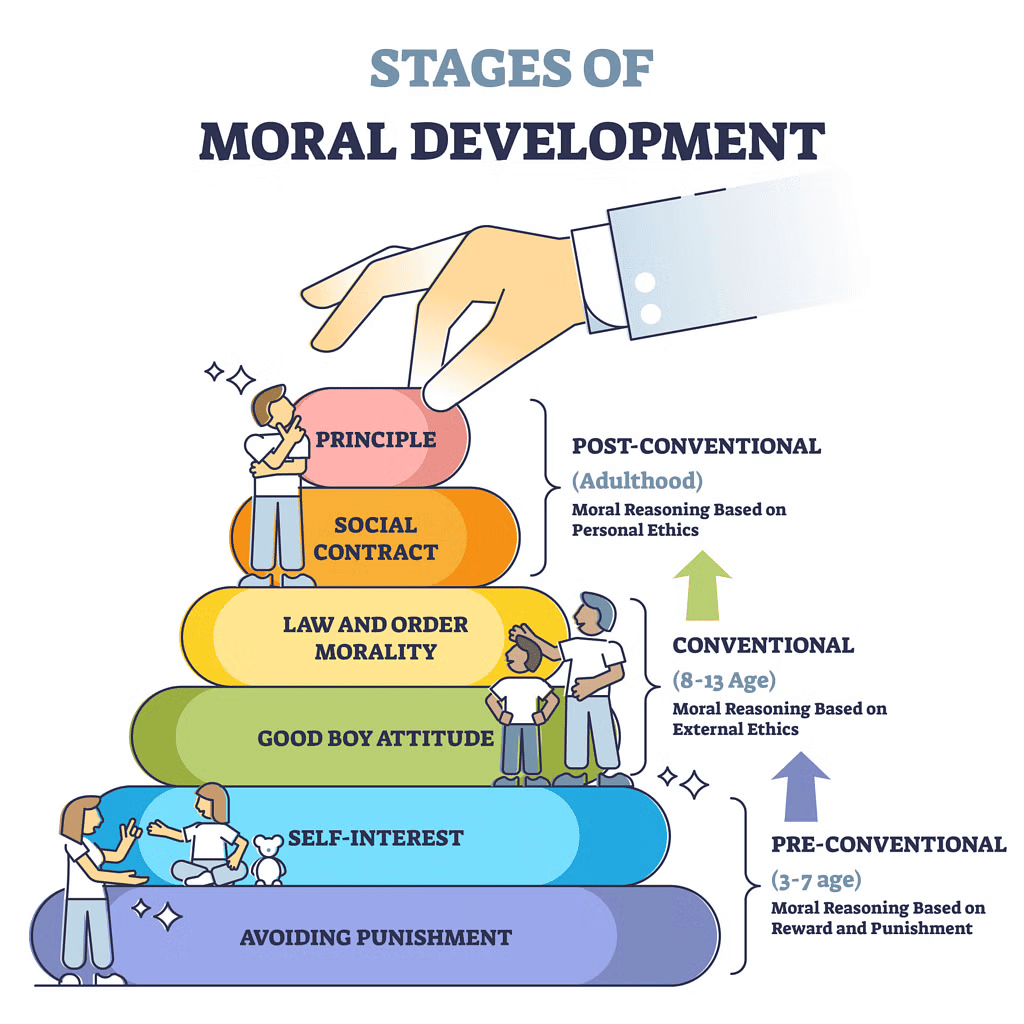
Stages of Moral Development
Stage 1. Infancy
- An infant does not yet have the capacity to moralize or understand right and wrong in a general sense.
- Infants expect nurturing to continue after birth and may view deprivation of needs (like hunger) as 'wrong' because it causes discomfort.
- They feel that they are the center of the world and develop a sense of rightness based on their needs being met.
Stage 2. Early Childhood
- By eighteen months, toddlers start to realize that others have needs and rights too, though they still lack the ability to judge right from wrong on their own.
- They learn what is 'wrong' through adult guidance and punishment, and begin to understand obedience to adults as the norm.
Stage 3. Pre-Schoolers (3 to 6 years)
- Children begin to internalize family values and understand the concept of the Golden Rule.
- They start to consider how their actions affect others and learn to be considerate.
- They expect adults to be in charge and understand consequences for their actions.
Stage 4. School Age or Later Childhood (7 to 10 years)
- Children begin to question the infallibility of parents and teachers and develop a sense of fairness.
- They believe in obeying rules and want to participate in making them.
- They start to negotiate and understand fairness based on equality.
Stage 5. Pre-teens and Teens (11 to 18 years)
- Adolescents strive for popularity and are influenced by peer values.
- They may try on different value systems to see which fit them best.
- They become capable of abstract reasoning about moral values and may view parents as consultants rather than authority figures.
From infancy to adulthood, moral development progresses from self-centeredness to consideration of family values, and finally to abstract moral reasoning.
Moral Behaviour
Moral behavior encompasses a person's attitudes, values, and actions. It is learned from society and its members, and internalized through reflection. Self-control is a crucial aspect of moral behavior, helping individuals adjust and understand others' perspectives.
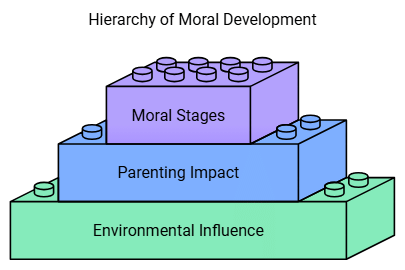
Effects on Moral Behaviour of a Child
- A child's self-consciousness is influenced by the environment they live in, including family culture, living habits, perceptions of events, and sensitivity levels.
- Parenting and teaching styles significantly contribute to a child's moral development.
- Lawrence Kohlberg expanded on Piaget’s theory by explaining moral reasoning development in children and adults, identifying six stages of moral development grouped into three levels:
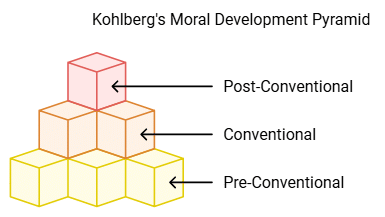
Kohlberg’s Six Stages of Moral Development
(i) Pre-Conventional Level
- Stage 1: Obedience and Punishment Orientation
Children follow rules to avoid punishment, viewing actions that result in punishment as 'bad'. - Stage 2: Self-Interest and Reward Orientation
Children follow rules based on self-interest, seeking rewards for obedience.
(ii) Conventional Level
- Stage 3: Good Boy or Good Girl Orientation
Individuals conform to social standards and seek approval from others. - Stage 4: Law and Order Morality
People understand the importance of obeying laws and social conventions for society's proper functioning.
(iii) Post-Conventional Level
- Stage 5: Social Contract Orientation
Laws are viewed as social contracts and are open to change for the greater good, based on democratic decision-making. - Stage 6: Universal Ethical Principle Orientation
Moral reasoning is based on abstract reasoning using universal ethical principles, and individuals may disobey laws they consider unjust.
These stages illustrate how moral reasoning evolves from external control to internal principles and universal ethical considerations.
Vygotsky’s Theory of Socio-Cultural Development
Socio-cultural theory, as articulated by Cole, John-Steiner, Scribner, and Souberman, posits that every function in a child’s cultural development appears twice: first, on the social level, and later, on the individual level. This implies that skills children learn first through interactions with others are internalized and utilized independently.
- The central idea of Vygotsky’s theory is that interactions with people and the culture they live in shape children’s mental abilities.
- Vygotsky emphasized the role of parents, relatives, peers, and society in forming higher levels of functioning.
- Contrary to Piaget’s theory, Vygotsky proposed that learning precedes development.
- Vygotsky’s theory introduces the concept of the Zone of Proximal Development (ZPD):
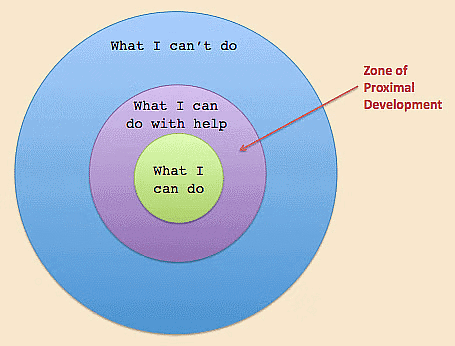
Zone of Proximal Development (ZPD)
- The ZPD is the gap between a person's actual developmental level, as determined by independent problem-solving, and the level of potential development, as determined through problem-solving under adult guidance or with more capable peers.
- It defines functions that are in the process of maturation but have not yet matured.
- Vygotsky's colleagues Bruner, Wood, and Ross introduced the term 'scaffolding' to describe the support provided by adults or peers to help a child complete a task they couldn't do alone.
Private Speech
- Private speech is when children talk to themselves, using speech to guide their actions.
- It starts as external speech and later becomes internalized.
- Through relationships with more capable individuals, children acquire information and use that understanding in their private speech.
Make-Believe Play
- Make-believe play, such as playing 'House', is crucial during the preschool years.
- Children use make-believe play to test multiple skills and achieve important cultural abilities.
- They engage in play to practice acting according to their internal ideas, not just external rules.
- Make-believe play allows children to simulate adult roles and practice social skills necessary for their culture.
Overall, Vygotsky’s theory emphasizes the importance of social interaction and cultural context in the development of higher mental functions.
|
68 videos|67 docs|36 tests
|
FAQs on Notes: Piaget, Kohlberg and Vygotsky Theory - Child Development and Pedagogy for CTET Preparation - CTET & State TET
| 1. What are the main stages of Piaget's Theory of Cognitive Development? |  |
| 2. How does Kohlberg's Theory of Moral Development explain moral reasoning? |  |
| 3. What is the Zone of Proximal Development (ZPD) according to Vygotsky? |  |
| 4. How do Piaget, Kohlberg, and Vygotsky's theories differ in their approach to development? |  |
| 5. What are the implications of Kohlberg's Six Stages of Moral Development for education? |  |























